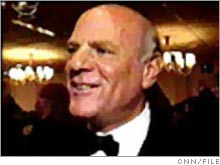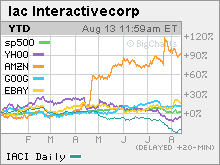Barry Diller's dilemmaIAC, Diller's Web conglomerate, has been the worst performing large Internet stock this year. Maybe that's because IAC isn't really a pure play dot-com.NEW YORK (CNNMoney.com) -- Are investors running out of patience with Barry Diller? The media mogul has built up Web conglomerate IAC through a series of acquisitions. IAC's numerous Internet properties include search engine Ask.com, financial services Web site LendingTree and ticket agency Ticketmaster.
But despite this diversity, IAC (Charts) has been the worst performing major media stock this year. Shares are down 26.5 percent, compared to a 6 percent loss for Yahoo (Charts, Fortune 500). Web retailers eBay (Charts, Fortune 500) and Amazon (Charts, Fortune 500) are both up in 2007, as is search leader Google (Charts, Fortune 500). Analysts say the biggest problem for IAC is that even though it owns several well-known Web sites - Evite, Citysearch and Match.com are also part of the IAC empire - the company is not really a pure play online media firm. Nearly half of IAC's sales come from its slow-growth and low-profit margin retailing business, which is comprised mainly of the company's decidedly unglamorous Home Shopping Network unit. When IAC reported its second-quarter results late last month, the company said that IAC's overall retail revenue grew just 1 percent form a year ago and that sales at HSN fell 1 percent. "We need to see signs of a turnaround. The company has been in perpetual turnaround mode," said Jeffrey Shelton, an analyst with Natexis Bleichroeder. Contrast the sluggish performance in retail with the 33 percent increase in revenue generated by IAC's media and advertising business, which includes Ask, Evite and Citysearch, and it's not hard to see why some on Wall Street are hoping that Diller will soon get rid of HSN. In addition, the company's membership and subscriptions business, which includes Match, reported a 13 percent increase in sales. "There has been quite a bit of speculation about HSN. Diller could potentially sell that business so IAC would be more Internet-focused," said Denise Garcia, an analyst with A.G. Edwards. "HSN is a business that really weighs heavily on IAC's stock because there are issues about inventory and the merchandising mix. "The company would do better without HSN. It would be a smaller company, but it would potentially be a much more profitable company," she added. Analysts have suggested that it could make sense for IAC to sell HSN to Liberty Media, the investment company controlled by John Malone that owns HSN rival QVC, in exchange for some of the Liberty-owned stakes in IAC and Expedia (Charts), the online travel company spun off from IAC in 2006 and still controlled by Diller. "A lot of people would be happy if IAC sold off the Home Shopping Network," said Scott Kessler, an equity analyst with Standard & Poor's. Still, investors appear to be tired of waiting for Diller to do something with HSN. Analysts said frustration is mounting about the company's unwillingness to buy back stock at these depressed levels. The company has a share repurchase program in place but has not bought back any stock this year. During the company's past two conference calls, the company has hinted that it is not using its $1.8 billion in cash to repurchase stock because there could be some sort of deal in the near future that is holding the company back. Investors typically applaud stock buybacks since they reduce the number of shares outstanding and therefore boost earnings per share. "Analysts have been asking about the share buyback but IAC is still very evasive and elusive about what they were going to do with their cash," Garcia said. Still, getting rid of HSN would not necessarily be a quick fix. Garcia said that even though IAC's Internet media businesses have done well, the company still needs to do a better job of cross-promoting its various Web offerings on all the sites it owns. Analysts said the company needs to try and boost the revenue per search figures at Ask.com, which lags behind Google, Yahoo and Microsoft's (Charts, Fortune 500) MSN in Internet search market share. "People wonder how Ask can compete with Google, which takes market share from everyone else quarter after quarter," said Shelton. In addition, when IAC's second-quarter results came out, investors were stunned to see that Ticketmaster, which accounts for 20 percent of IAC's overall revenue, reported only a 3 percent increase in sales and a 24 percent decrease in operating profit. In the past, Ticketmaster has been one of the stronger performing parts of IAC. "The business that threw a wet blanket on people's hopes is Ticketmaster," said Kessler. "People had always been impressed by the revenue and profitability that Ticketmaster generates." Kessler added that the troubles in the housing market are also hurting IAC's other big Web transaction-based business, LendingTree. Revenue fell 9 percent in the second quarter and LendingTree reported a slight operating loss. Nonetheless, Kessler thinks IAC might be a bargain right now. He cites the fact that the company, with a stock price of around $28, is trading below its book value of about $31.70. Book value is equal to a company's assets minus its liabilities and is a measure often looked to determine how much a company could be worth if it was sold or broken up. Along those lines, Shelton said he's "cautiously optimistic" that Diller and Malone will work out an HSN deal sooner rather than later. "Ultimately, an HSN transaction will get done. The issue is price," he said. But Garcia is taking a wait-and-see approach on the stock. She has a "hold" recommendation on IAC. And she's not alone. In fact, 16 of the 18 analysts following the company have it rated a "hold" and only two rate it a "buy" according to Thomson First Call. "HSN has gotten IAC to where it is today. It's almost half of revenues even though margins are in the low single digits. IAC is an emerging new media business stuck with an old business," Garcia said. So as long as HSN is around to weigh down IAC's overall growth prospects, IAC's stock probably won't get back on track anytime soon. Analysts quoted in this story do not own shares of the companies mentioned in this piece and their firms have no investment banking ties with them. |
Sponsors
|





